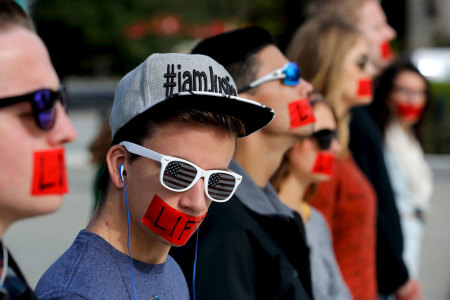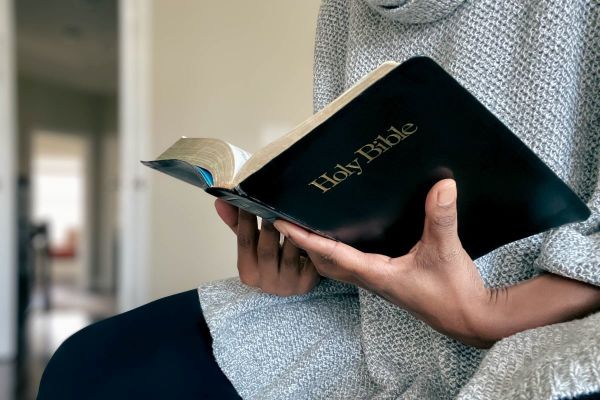Should Men Have a Voice in Abortion Debates?

Is abortion something only women can discuss?
Last week, actress and The View co-host Whoopi Goldberg spoke about abortion on the popular morning talk show, saying, "You guys will never have to make this decision."
Meanwhile, media coverage of a recent Congressional hearing focused primarily on the "hostile questioning" faced by Planned Parenthood President Cecile Richards — rather than specifics of what she revealed.
Many say it's "their body, their choice": it is women who get pregnant, women who have abortions, and only women who suffer emotionally after an abortion. I beg to differ.
After counseling countless numbers of people in post-abortion healing — and facing my own painful abortion at the hands of Planned Parenthood — I can tell you that men undeniably suffer every bit as much as women.
Abortion is not a women's issue. It's a human issue, with devastating consequences for men and women alike.
Does the father have rights related to his unborn child? No, he doesn't carry the unborn child, but he has contributed half of that baby's DNA. At least three people (not to mention grandparents, siblings and ancestors) have a stake in a woman's decision about "her body, her life."
A man who shares in the act of conceiving a new life has a responsibility to care for and raise that child. When he abandons the mother and his pre-born baby, whether passively supporting an abortion or actively insisting on it, that father sins and casts off his God-given role.
Men carry a great burden in our national guilt over abortion, and no one should deny them a voice.
For millions of American men, Father's Day is a painful reminder that because of their action (or inaction), they have lost one or more children to abortion. The tentacles of abortion's destruction affect men and women dramatically. Since the legalization of abortion in 1973, millions of babies have been lost to abortion and millions of fathers — just like the mothers — have lost a part of themselves, too.
If mothers are mothers from conception, then it stands to reason that fathers are fathers from conception as well. Unfortunately, since 1973 when the Roe v. Wade decision was handed down, a father's rights with respect to his unborn child were stripped away. Our societal mantra proclaims that a father's responsibility begins at birth, not from conception.
Fast-forward 42 years later, and we're a nation of the walking wounded: no one escapes the horror of abortion. What was once the perfect "solution" is now an agonizing hell. Abortion has become an equal opportunity killer … especially so in the black community.
Speaking from his experience in social work, Branden Polk recently asked: "Can you imagine living in a world where all the men are gone? This is the reality for most black communities ... In many communities, more black babies are being aborted than are being born."
Men are born to be fathers — to be strong, honorable protectors and providers. It's inherent for men to be defenders of the weakest of us all. And even those who once sat on the sidelines, comfortable in their decision to stay out of the fray, are rethinking their stance.
A columnist for The Daily Beast recently revealed how his wife challenged his pro-choice views: "These are babies that are being killed. Millions of them," she said. "And you need to use your voice to protect them. That's what a man does. He protects children — his own children, and other children. That's what it means to be a man."
The author of the piece goes on to write that he now finds himself "on the bubble" on his pro-choice position, particularly in the wake of the undercover video investigation of Planned Parenthood detailing the harvesting and sale of fetal body parts.
Following an abortion experience, men and women alike experience a maze of emotions — depression, guilt, shame and loss of self — just as their most intimate relationships crumble. Is it any wonder there are millions of fathers who mourn those they did not protect and provide for … let alone the fact that they often had no real say in the decision whatsoever?
Men are emotional beings just like women, and grieve their loss much like women. But with an abortion, grief is denied — there is no dead child to hold or a funeral to attend. Societal convention often maintains that there was never even a life to begin with.
Vincent Rue, Ph.D., pioneer researcher in the field of men and abortion, writes in The Effects of Abortion on Men that
"Men do grieve following abortion, but they are more likely to deny their grief or internalize their feelings of loss rather than openly express them … When men do express their grief, they try to do so in culturally prescribed 'masculine' ways, i.e., anger, aggressiveness, control. Men typically grieve in a private way following an abortion. Because of this, men's requests for help may often go unrecognized and unheeded by those around them …
A guilt-ridden, tormented male does not easily love or accept love. His preoccupation with his partner, his denial of himself and his relentless feelings of post-abortion emptiness can nullify even the best of intentions. His guilt may prevent him from seeking compassion, support or affection. In turn, he 'forgets' how to reciprocate these feelings."
There are a host of symptoms men and women experience following abortion, commonly referred to as Post-Abortion Stress Syndrome (similar to Post-Traumatic Stress Disorder after experiencing combat). Left untreated, these symptoms can intensify over time. Lives are ripped apart, marriages torn asunder, families irrevocably broken.
If you haven't experienced an abortion in your past, you likely know someone who has. Will you speak up for those who can't and encourage those wounded from abortion to find their voice?
There's plenty of room at the table for everyone to have a voice in the national debate over abortion. Because regardless of your philosophical, ethical or religious beliefs, abortion has universal implications. It affects us all.
Reprinted with permission from Bound4LIFE.





















